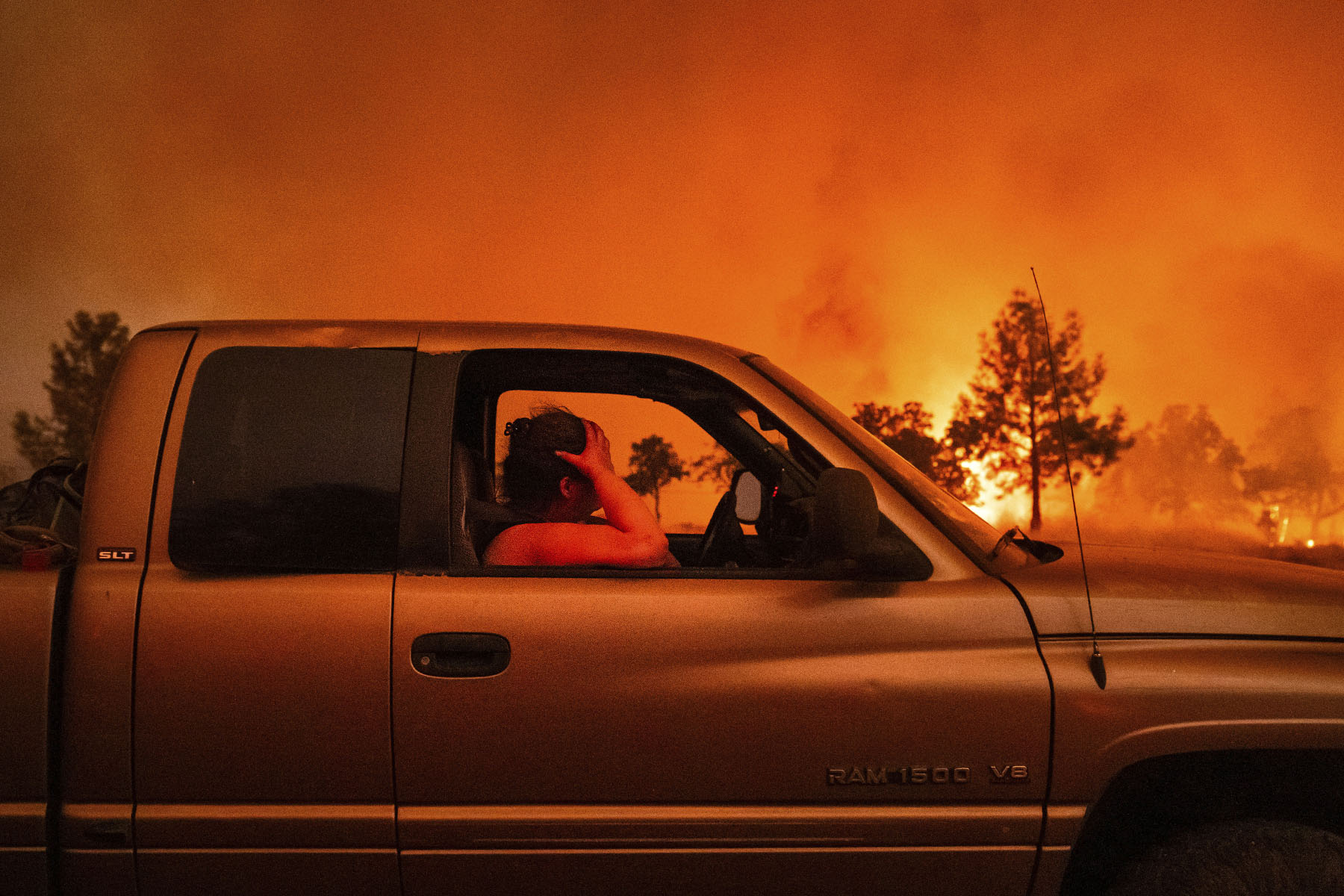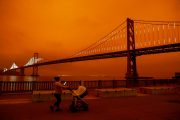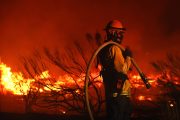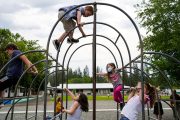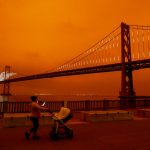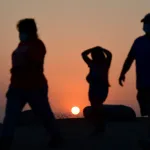What do you want to know about the environment & climate? We want to hear from you, our readers, about what we should be reporting and how we can serve you. Get in touch here.
On Wednesday, the New York City skyline was encased in an orange haze due to wildfire smoke that had moved eastward from Canada; 100 million Americans were under air quality alerts. It was an eerie marker of the climate crisis, which is leading to longer and more intense wildfire seasons, exposing a greater number of people to wildfire smoke than before.
Studies have found that wildfire smoke is even more toxic than air pollution and is dangerous because it increases the concentration of the fine particulate matter PM2.5 in the air, pollution particles so tiny they can get into the lungs and blood, which can lead to a host of health problems.
Some people are more vulnerable to the health impacts of wildfire smoke than others, including pregnant people. And the inhalation of wildfire smoke can impact their health and pregnancies.
“A pregnant person is breathing for two,” said Dr. Marya Zlatnik, an OB-GYN at University of California San Francisco.
Pregnant people breathe more deeply than others. As a result, Zlatnik said, “they are exposed to more of whatever is in the air.”
To help pregnant people better understand the risks, The 19th spoke with Zlatnik and other experts about what the research says on wildfire smoke and pregnancy and what people can do to protect themselves.
But Zlatnik also hopes people see wildfire smoke as a call to action: “I think for everybody this really should be a wake-up call about the fact that we’re not doing enough to fix the larger problem of climate change,” she said. “I would really encourage people who are growing their families to think about the fact that the next few years are really important for us to try and bend the curve so that we don’t end up in worse shape.”
What does the research say about wildfire smoke and its impact on pregnancies?
Several studies have shown that wildfire smoke is associated with a higher risk of preterm birth and lower birth weight, said Rebecca Schmidt, associate professor at the University of California, Davis Department of Public Health Sciences.
Schmidt is working on research to better understand the long-term health impacts of wildfire smoke. But in the meantime, she and other experts say research on air pollution’s impact on pregnancy offers some understanding of the possible health risks.
“Those studies have shown links with some of these [pregnancy] outcomes and with other child’s health outcomes like neurodevelopmental outcomes and respiratory outcomes,” Schmidt said. “That’s kind of concerning to parents.”
Air pollution studies also point to risks to a pregnant person’s health, Zlatnik said.
“For the pregnant person herself [the air pollution studies show] there is a higher risk for hypertensive disorders with pregnancy, so things like preeclampsia,” Zlatnik said. Although there is not enough literature to say for certain the same would be the case for wildfire, she said it is “fair to assume” that pregnant people exposed to smoke could also be at a higher risk of hypertension.
Preeclampsia is a potentially life-threatening complication known for causing high blood pressure, usually after 20 weeks of pregnancy. Black people are at higher risk for developing this condition. And pregnant people who have asthma, which can be triggered by smoke, are at an especially high risk of developing hypertension, said Dr. Anthony Scialli, a D.C.-based OB-GYN.
In addition, pregnant people have weakened immune systems, which makes them more susceptible to illnesses caused by smoke.
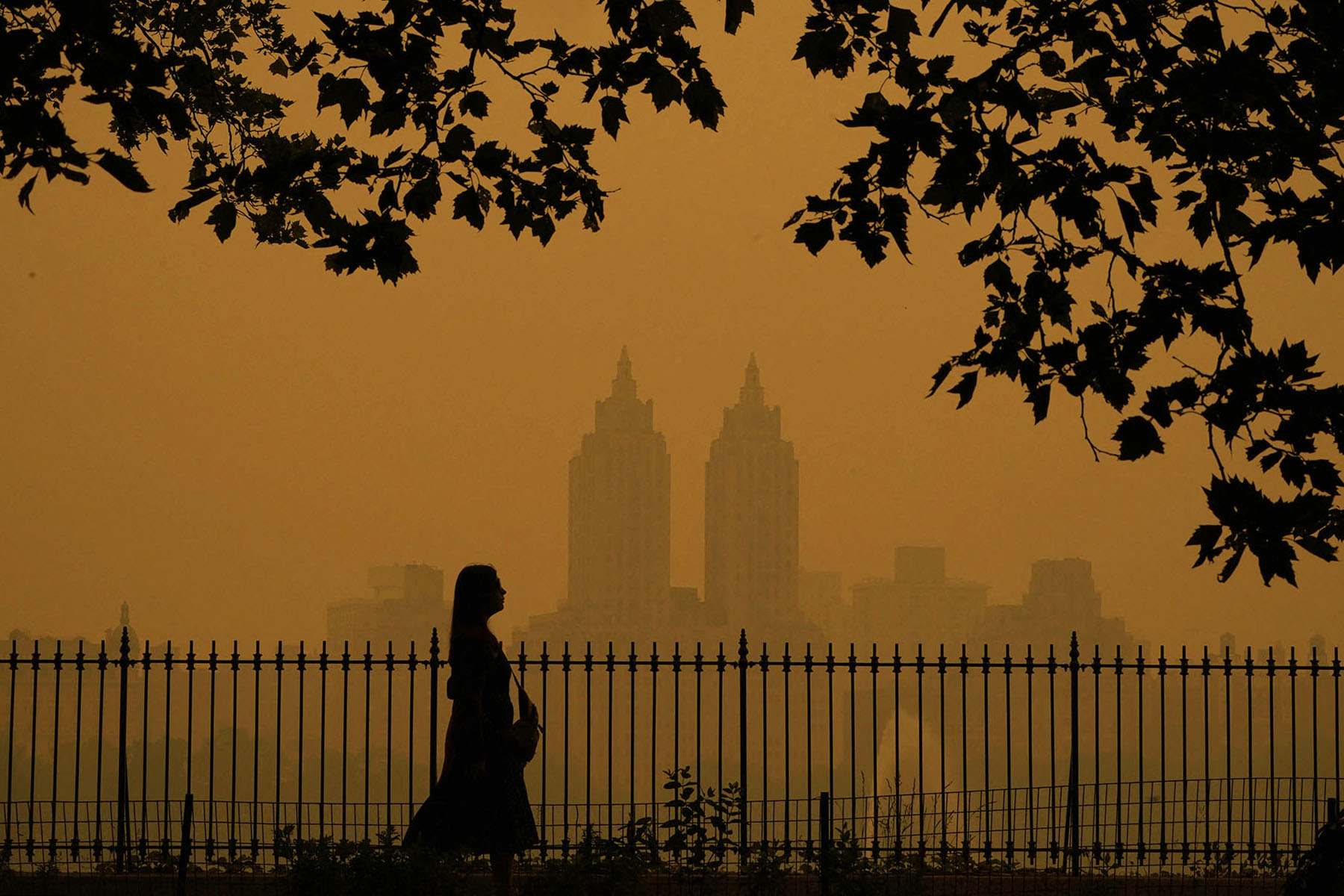
How do we know about these risks?
A lot of the available research is based on examining large databases of birth records and looking for trends and associations in birth outcomes and exposure to wildfire smoke, Schmidt said. While these are helpful, “getting a more detailed look at actual exposure and thresholds and points to intervene still needs to be done,” she said.
In other words, there is still a lot we don’t know.
In recent years wildfires have become more destructive, leading to higher smoke exposures. One study of nonhuman primates completed during the 2018 Camp Fire in California found that when female macaques were exposed to wildfire smoke early in their pregnancy, with the Air Quality Index reaching as high as 185 — when it is over 100 it is considered unhealthy for sensitive groups — there was an association with an increased risk of pregnancy loss. For reference, in New York City, the AQI hit 405 at its peak on Wednesday, the worst in its recorded history.
“These are super high particulate matter events, where there were kind of unprecedented amounts of smoke exposure for a shorter period of time,” Schmidt said about the fires in recent years in California.“It’s a reminder to do what we can to reduce exposure, especially for pregnant women and other more susceptible individuals during these events.”
-
Read Next:
What should a pregnant person do to keep themselves safe from wildfire smoke?
For anyone dealing with unhealthy levels of wildfire smoke, experts and doctors recommend limiting exposure by staying inside if you can and paying attention to local air quality advisories.
If the air quality is bad and you do have to go outside, researchers and doctors recommend wearing an N-95 mask. Zlatnik said if you can’t get your hands on one of those, even a surgical mask — the thin blue ones everyone donned in the early days of the pandemic — can filter out some of the particulate matter that makes wildfire smoke dangerous, but they are much less effective.
There are a lot of simple measures to keep the air clean inside of the home, said Jessalyn Ballerano, a program coordinator with nonprofit advocacy organization Nurturely, which focuses on perinatal equity. One relatively inexpensive solution is to use sealant around windows, like caulk, to fill in gaps and prevent dirty air from coming into a house.
Some states, cities and even nonprofits also provide free resources like air purifiers or air filters to residents who qualify. Central air conditioning systems are also equipped with filters that clean the air. Though it’s important to remember to change the filters — Zlatnik recommends using a MERV 13 filter.
There is also a pretty inexpensive way to clean the air in your house by using a box fan and air filters, Schmidt said. “They’ve been shown to be effective at reducing particulate matter that could cause harm.” Information on how to do that is here.
“It’s even more effective if you can put it in the room you’re in most of the time,” Schmidt said. “Anything you can do to limit your smoke exposure.”
Zlatnick said it is important to not add to indoor air pollution: Don’t light candles, for instance, and don’t vacuum because, though it seems counterintuitive, it can actually add dust to the air. “The one nice thing about that is it’s less work,” she joked.
-
Read Next:
What are some signs a pregnant person should consider reaching out to a health provider?
If a pregnant person is having more trouble breathing than usual they should contact their health care provider, said Zlatnik, who specializes in high risk pregnancies. The caveat is that it’s not unusual to have some periods of being short of breath if you are pregnant, particularly if you are walking or moving around. But, she said, if you are noticing shortness of breath that feels abnormal when you are resting, or are coughing up something that could be concerning, contact your doctor.
She said she’d also be concerned about symptoms of preterm labor, more than five contractions in an hour. Bleeding or leaking fluid would also be warning signs.
-
Read Next:
How much should wildfire smoke concern a pregnant person?
Experts agree that while wildfire smoke is worrisome, there are a lot of precautions a person can take to make the risk more manageable.
“I think it’s a good idea to lower your exposure as much as possible, but on the flip side, I do want to say that developing babies are very resilient,” Schmidt said. “Most kids born after some of these major wildfire events have good health. Be reassured and don’t stress out too much if you are getting some of that exposure.”
Stress can impact a pregnancy, which is why it is important that people take measures to reduce their anxiety, she said.
“Find clean air to take some deep breaths and use whatever coping skill you might have to actually just regulate your nervous system,” said Ballerano, who previously worked as a doula. “Get your heart rate down, give yourself a sense of groundedness and come back into your body and get out of that activated flight-or-fight response.”
Ballerano said to recognize that feeling stress, and heightened levels of it while pregnant, isn’t abnormal, particularly when dealing with wildfires and living through the climate crisis.
“One thing I want [pregnant people] to know is that, especially while pregnant or parenting, everything in your brain is wired to try to resolve risk,” Ballerano said. Getting in touch with a counselor, a trusted friend, a therapist, another kind of mental health provider who can help you have a bearing on what’s going on is important, too, she added.
Where can someone look for more information about how wildfire smoke might impact their pregnancy?
- The Centers for Disease Control and Prevention has a web page specific to wildfire smoke and pregnancy that has some helpful information on how to keep yourself safe.
- If you want to keep track of air quality where you live, type your ZIP code in at airnow.gov and see the latest information.
- The Western States Pediatric Environmental Health Speciality Unit has a wealth of information on wildfire smoke and its impacts on children, as well as helpful tips for how to protect yourself.
- Nurturely has a project called Wombs and Wildfires that in the coming months will include a free toolkit aimed at helping pregnant and postpartum people build resilience to wildfire smoke and stress.
